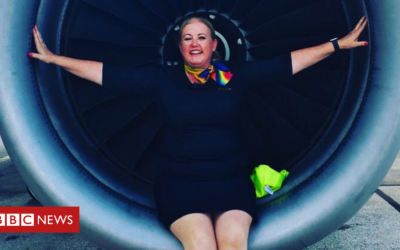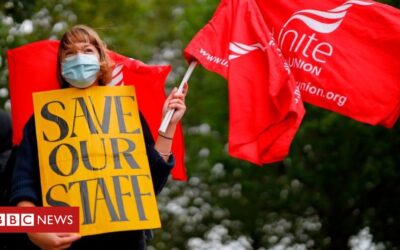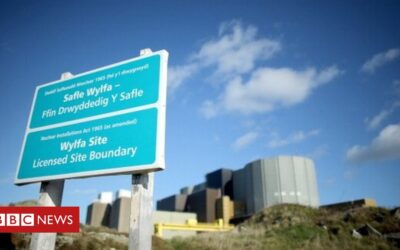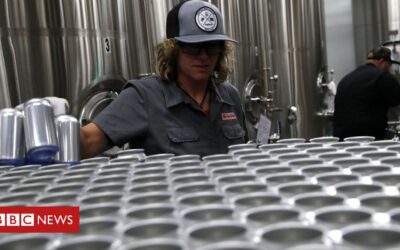The UK’s inflation rate fell sharply to a five-year low of 0.2% in August as the effect of the Eat Out to Help Out scheme pushed down restaurant prices.July’s Consumer Prices Index (CPI) inflation figure had been 1%.The VAT cut in the hospitality sector from 20% to 5% was also a factor, said the Office for National Statistics.Low inflation is good for consumers and borrowers, but can be bad for savers, as it affects the interest rates set by banks and other financial institutions.The eating out scheme, which ran from Monday to Wednesday in August, offered 50% off food up to the value of £10.”The cost of dining out fell significantly in August thanks to the Eat Out to Help Out scheme and VAT cut, leading to one of the largest falls in the annual inflation rate in recent years,” said ONS deputy national statistician Jonathan Athow.”For the first time since records began, air fares fell in August as fewer people travelled abroad on holiday. Meanwhile. the usual clothing price rises seen at this time of year, as autumn ranges hit the shops, also failed to materialise.”It was the lowest inflation rate since December 2015.What is inflation?Inflation is the rate at which the prices for goods and services increase.It affects everything from mortgages to the cost of our shopping and the price of train tickets.It’s one of the key measures of financial well-being, because it affects what consumers can buy for their money. If there is inflation, money doesn’t go as far.Read more here..Last month, discounts for more than 100 million meals were claimed through the Eat Out to Help Out scheme.Prices in restaurants and cafes were 2.6% lower than in August last year, the first time they had been negative since records began in 1989, the ONS said.What is the UK inflation rate?Before the latest figures were published, there had been fears that the UK inflation rate might turn negative, giving rise to what is known as deflation.Economists fear deflation because falling prices lead to lower consumer spending, as shoppers put off big purchases in the expectation that they will get cheaper still.Thomas Pugh, UK economist at Capital Economics, said August’s figure was probably “the low point” for inflation, but pointed out that it was unlikely to hit the Bank of England’s 2% target within the next few years.”The big picture is that it will be a few years before the economy is strong enough to sustain CPI inflation at the 2% target,” he said.”The big risk to this view is a no-deal Brexit, which could cause a slump in the pound and, in turn, a temporary sharp rise in inflation to above 3.5%.”Inflation is calculated by looking at a “basket” of commonly purchased goods and comparing how much they cost now to last month and to the same time last year.During the pandemic, the ONS has been unable to identify prices for many of the 720 items it usually monitors.In August, the ONS said prices for only eight items were still unavailable, reflecting parts of the economy still unable to operate normally including cruises, live music, theatre, swimming pools and soft play sessions.
BBC Business News Articles
Lego to ditch plastic bags after children call for change
Lego will start replacing plastic packaging with paper bags from 2021 as the toy brick maker aims to become more sustainable.Lego said it had been prompted by letters from children asking it to remove the single-use plastic bags.It said it would be investing up to $400m (£310m) over three years to improve its sustainability efforts. Lego bricks themselves are made of plastic, although the company is exploring alternative materials.”We have received many letters from children about the environment asking us to remove single-use plastic packaging,” Lego Group chief executive Niels B Christiansen said.”We have been exploring alternatives for some time and the passion and ideas from children inspired us to begin to make the change,” he added.From next year the toy company will start introducing recyclable paper bags, certified by the Forest Stewardship Council, to package its loose bricks.This is part of Lego’s ambition to make all its packaging sustainable by the end of 2025. “Children liked the paper bags being trialled in 2021 as they were environmentally friendly and easy to open,” Mr Christiansen added.Pressure has been growing on retailers to reduce their use of plastic bags and packaging. However it is not always straightforward to ensure alternatives aren’t more carbon intensive to produce, transport and recycle. Lego said its investment would also go into educational programmes and efforts to make the company more sustainable in other areas.In 2015, the Danish firm set a target to make its products from sustainable materials by 2030. As part of this pledge it will expand the use of bio-bricks, such as those using sugar cane as a component.Earlier this month Lego said sales and profits had risen in the first half of this year as consumers bought more of their products during lockdowns to restrict the spread of coronavirus. It said families bought bigger and more complicated Lego sets to keep themselves busy.The toy maker plans still plans to open 120 new Lego stores around the world this year despite the pandemic which saw most bricks-and-mortar shops closed for extended periods.
Brexit freight system 'will be ready on time'
The government has denied claims that a new freight management system will not be ready when the EU transition period ends. The system is seen as vital for preventing delays when post-Brexit freight arrangements come into place on 1 January. One industry body had expressed concern that only a beta – or test – version would be available. But the government insists it is a fully operational digital service. The so-called Smart Freight system ensures that trucks are carrying the correct documentation before they travel to ports.The new system is designed to reduce delays at ports, and to better manage traffic into Dover and queues of lorries building up along the M2 and M20 motorways in Kent.Truck drivers could face a fine if they arrive at ports without the proper documentation, but the government insists this will be a last resort, and unnecessary if they follow the rules. Brexit: Port ‘chaos’ warning over customs systems
Driver-free freight terminal opens in Essex
Logistics UK, which represents freight businesses, said it was informed by government officials on Monday that a beta – or test – version would be available in December, but would not be fully operational until April. In a statement, the Director of Policy at Logistics UK Elizabeth de Jong said it was unacceptable and a “massive blow to UK businesses and the economy”.But the government now says “beta” is a standard labelling practice for a digital service that is fully operational, and that it has reassured industry that Smart Freight will be operational by December.
CEO Secrets: 'We gave staff shares, not salaries'
When you are starting up a business and cash is tight, how do you pay your staff? One app maker, called Blueheart, offered to pay employees with shares in the new firm, rather than salaries.As the CEO of Blueheart explains, this got the firm through the critical first few months until it could afford the wage bill.Video by Jeremy HowellYou can learn more about the CEO Secrets series here.
Teen entrepreneurs’ top business tips
Jez wants to be known as the entrepreneur that puts the Midlands on the map, while Zack aims to give something back to young people who struggled at school like him. These two young businessmen began their businesses in different ways when they were at school but now have both managed to adapt and keep them running during the pandemic. You can find stories by other young people on the BBC Young Reporter website.Follow BBC Young Reporter on Twitter and YouTube.
Thomas Cook: 'I wish the business well'
Former flight attendant Grace Fletcher says she and some former colleagues would do anything to get back into aviation. She loves her current job, helping vulnerable children in the prison service, but would also do anything to “reverse the clock,” she says, to the 27 years she spent working at Thomas Cook. “It was very sad when everything went down. We were like a family, our Birmingham crew, and I found it really difficult in the last year without them,” says Grace. Thomas Cook relaunched today as a travel website almost exactly a year after the company’s spectacular collapse. The last hours of working for the company were tough. Cabin crew on the last flights were searched and escorted out “like criminals,” she says.”It all had been so terrific, until that moment,” says Grace. “I found I had no job after 27 years by switching on my phone and seeing headlines.” She and her former flight crew colleagues have watched the relaunch of Thomas Cook with great interest and were sad to learn there would be no planes and no flight staff.Scott Robson worked as a holiday rep in Salou and Benidorm.He says: “It’s really nice to know the Thomas Cook brand and legacy will be carried on into the future.”It is sad to know that myself and my other colleagues that fought so hard to keep the company going won’t be part of this relaunch, but I understand it won’t or wouldn’t be the same.He says it did “slightly anger” him that the relaunch is so close to the anniversary of the collapse.”I still get upset over the events of just under a year ago. I’m sure a lot of my other colleagues do to,” Scott says.However, he wishes the new firm “all the success in the world and I do hope one day I may be able to work for the company again.”Ross Milne, who worked for Thomas Cook for 12 years, says he’s “very annoyed” that Thomas Cook is being relaunched, “especially so close to it being one year after the collapse”.”[I] don’t want to support the company, and will be using others to book holidays,” he says.Betty Knight was cabin crew for 12 years.She says: “Although it was a great shock and devastation to everyone at the airline when the Thomas Cook group collapsed, and took the highly profitable airline with it, I know Thomas Cook Airlines would have their workforce back in heartbeat in just about every area of the company.”They were great to work for, to travel with and they were such a loved British Institution.”It wasn’t fair or right what happened, so many people were badly affected, let down or inconvenienced.”But if Thomas Cook slowly and surely could rise again, adapt, change and grow into the new circumstances we find ourselves in, I know that this hard time would have been a glitch, a hiccough in the astonishing 178-year legacy that many would be delighted to see continue. “My uniform could be ironed and on in a couple of hours, as would that of thousands of my former colleagues. I wish Fosun well.”Amy Hinch was a Thomas Cook retail business partner.She says: “For me, I think it’s amazing that it’s relaunching and there’ll be a creation of more jobs from a UK perspective, however I can’t help but feel the name and brand are a little tarnished.”I’ve seen comments from the general public around ‘I won’t be booking with them, they owe me a holiday from when they collapsed’.”[It’s] sad that the launch is so close to the anniversary, but it is what it is. I wish the business well.”Bookings for the new version of Thomas Cook will be online only without aircraft, hotels or shops. Wholly owned by China’s Fosun Tourism Group, the company is licensed by the CAA and is Atol-protected. The company collapsed last September under £1.7bn of debt, and more than 150,000 stranded holidaymakers had to be brought home. Fosun paid £11m for the Thomas Cook trademarks, websites and social media accounts. The new business model will be built on commissions collected from flight, hotel and hire car transactions.The website starts selling packages on Wednesday, to holiday destinations on the government’s safe travel corridor list.Half of the staff will be former Thomas Cook employees that have been re-hired by Fosun. That includes many of the senior team, and technical and customer support. Staff are currently working from home. The company had hired an office space, but has found that as an online company launching in the midst of the coronavirus pandemic, home working proved a better option.The travel and tourism industry has been hit hard by a coronavirus collapse in trade.Britain’s Hays Travel, which bought the bulk of Thomas Cook’s High Street outlets and took on many ex-staff, is cutting almost 900 jobs.And Tui, Thomas Cook’s biggest rival before the collapse, received €1.2bn (£1bn) in aid from the German government.
Coronavirus: How we faced redundancy in lockdown
Young people are bearing the brunt of rising unemployment, with 16-24 year olds losing more jobs than any other age group. Radio 1 Newsbeat has been speaking to some of them about how it feels when you’re made redundant in a pandemic.Danielle Kelly Keener lost her job as a flight attendant. Twice.”I was with British Airways until March, when I was made redundant,” she says.”And then I was supposed to be starting with EasyJet mid-pandemic and lockdown, and they made me redundant before I could even start with them.”I feel like I might need to take a little break for a while and wait for the industry to pick up again before I can think about applying for another airline.”Danielle says it’s been a really tough time for her colleagues in the airline industry, but that they’ve been in constant contact, offering each other emotional support.”It’s a shame because I did want to make this my career – it suited my lifestyle and my personality.”It’s quite degrading, knowing I have to find a job for money, which I feel might bring me down a little bit but I’m going to try and keep positive,” she says.I got a job after 280 rejectionsJobless in the pandemic: It’s hard to stay positiveShe says the uncertainty of not knowing if she was going to lose her job has increased her anxiety – and there’s been a lot of “ups and downs between a positive mind set and a stressed one”.Tom Amber lost his marketing role during the pandemic, which was his first job since graduating last year.”I was frustrated initially because I was made redundant before the furlough scheme expired and my company had grown last year’s revenue,” he says.”It feels like lots of corporations are not being very human or factoring in the Covid situation.”But Tom’s going to take the setback and turn it into a positive. Rather than look for a new job, he’s going to take the redundancy cash and use it to go travelling around South East Asia. “I never thought I’d have the funds to travel properly so this has changed my outlook.”Two weeks before my redundancy news I was in the process of getting a mortgage, now I’m willing to not have one for several years,” he says. Redundancy happened to Lucy Hart for a second time last year – but it’s taught her some practical advice she thinks could come in handy for those feeling anxious at the prospect of finding a new job.She’s spent a lot of time working at start-ups, which often fold if they fail to make a profit.”It all came as a bit of shock – I’d never really prepared for what would happen if I suddenly didn’t have my job,” she says.”I thought I had two months to find a job and actually had one, which is quite a big difference for for that kind of thing.Lucy says she’s learnt a lot about how to prepare if you think you might lose your job.”It’s worth doing some prep like updating your CV in advance,” she says.”One thing I find useful is writing down your achievements at the job you’re at now – having a bullet point list ready.”Also start conversations with people who work at companies you’re interested in, not necessarily formally applying but following people on LinkedIn and reaching out.”She says you shouldn’t be nervous about talking to your employer because they might have an idea of what other jobs you could be suited to in your industry, or where you might be able to find work.And one last piece of advice?”Save enough money for like two months of rent – that was quite a surprise to me!”Follow Newsbeat on Instagram, Facebook, Twitter and YouTube.Listen to Newsbeat live at 12:45 and 17:45 weekdays – or listen back here.
'Redundancy floodgates will open' says Unite union
The Unite union has called on the government to say it will extend its furlough scheme or face “redundancy floodgates” opening in the UK.Many workers can expect a “miserable Christmas” without targeted support for employers, the union warned.The government’s furloughing programme will end on 31 October.A Treasury spokesperson said the government has “not hesitated to act in creative and effective ways to support jobs and we will continue to do so”.Wednesday marks 45 days before the end of the furloughing scheme, which is the same amount of time employers must give for notice of redundancy.The Unite union said on Wednesday that without “a clear and urgent sign” from the government that it is responding to calls to extend the scheme, it fears that “employers facing short-term struggles will issue redundancy notices.”Extension callsThe government has been urged by MPs, business groups, unions and political opponents to continue the furloughing programme, in which workers placed on leave receive 80% of their pay, up to a maximum of £2,500 a month.The scheme, which has cost more than £35bn, was initially funded by the government, but firms started to contribute to wages in September after the scheme began to wind down.Coronavirus: When will the furlough scheme end?
Rishi Sunak: New ways to protect jobs ‘my priority’
Last week the Treasury Select Committee said the government should consider a targeted extension of the scheme.In the first week of September manufacturers warned of a second wave of job cuts without an extension, and industry group the CBI said a replacement was needed to avoid a “cliff edge”.On Monday the TUC said Chancellor Rishi Sunak should act to prevent a “tsunami” of job losses.On Tuesday Labour leader Keir Starmer called for the scheme to be replaced.Unite general secretary Len McCluskey said on Wednesday that a signal from the government on targeted extension of the scheme would “put a floor under struggling employers who are working hard to stabilise in the face of immense challenges”.”With our competitor nations announcing the extension or modification of their jobs retention schemes, we ask that your government recognises the need for UK businesses and workers to receive similar support,” Mr McCluskey wrote in a letter to Prime Minister Boris Johnson.A spokeswoman said Unite wanted to see support for sectors including manufacturing, aviation infrastructure and aerospace, and hospitality.’Move on’But in August the government plan to end the scheme was backed by Bank of England Governor Andrew Bailey, who said it was important that policymakers helped workers “move forward” and not keep them in unproductive jobs.Prime Minister Boris Johnson has said extending the scheme would only keep people “in suspended animation”.The government has repeatedly rebuffed the calls for an extension to the scheme, saying that it has served its purpose in cushioning the economy during the coronavirus crisis.Chancellor Rishi Sunak has said his priority is to find new ways to protect jobs.A Treasury spokesperson said: “The furlough scheme has done what it was designed to do – save jobs and help people back into employment”.The spokesperson said the government has made “unprecedented interventions” including firms being given £1,000 for every furloughed worker still employed in January, business rates holidays, VAT cuts and the Kickstart scheme, which gives young people jobs experience. “We’ve not hesitated to act in creative and effective ways to support jobs and we will continue to do so as we recover from this crisis,” the spokesperson added.Coronavirus hitThe Coronavirus Job Retention Scheme was hailed by the National Institute of Economic and Social Research (NIESR) in July as “an undeniable success in terms of keeping furloughed employees attached to their jobs,” with 9.5 million people on the scheme at the time.But employers planned more than 300,000 redundancies in June and July as the effects of coronavirus continued to hit the economy.Firms have continued to take staff from payrolls as they prepare for the end of the scheme.About 695,000 UK workers have gone from the payrolls of UK companies since March.
Nuclear: Hitachi 'withdraws' from £20bn Wylfa project
Plans for a £15-£20bn nuclear power plant in Wales have been scrapped.Work on the Wylfa Newydd project on Anglesey was suspended in January last year because of rising costs after Hitachi failed to reach a funding agreement with the UK government.Isle of Anglesey council said the company had now confirmed in writing it is withdrawing from the project.Council leader Llinos Medi said: “This is very disappointing, particularly at such a difficult time economically.”Hitachi shelved the scheme, the biggest energy project ever proposed in Wales, over funding issues.Anglesey council said it had received a letter from the Tokyo-based parent company confirming its decision.Developer Horizon Nuclear, which is owned by Hitachi, said it would not comment.The UK government also declined to comment but the Welsh Affairs Committee has said the Wylfa nuclear power project withdrawal is “a blow for Wales and the UK’s ambition to achieve net-zero carbon emissions by 2050.””This was set to be the largest energy project Wales had ever seen with a positive impact on skills and employment in the region,” said committee chairman Stephen Crabb MP.”With the nation’s remaining nuclear plants ageing and the need for low-carbon, high yield plants needed to replace them urgent, it has never been more important than now to ensure energy security.”Mr Crabb added that Hitachi had given “reassurances” of its commitment to the project over the summer “that gave hope to the workers who’d be needed to construct it and the high-skilled employees who would run it”.Developers said the plant would create up to 9,000 jobs during the construction phase and have a 60-year operational life.Campaigners against the project – a replacement for the original Wylfa plant shut in 2015 after 44 years of service – welcomed Hitachi’s move claiming a “nuclear power station would have endangered lives on Anglesey and beyond”.The People Against Wylfa B action group said: “It would have ruined the environment over an area which is 10 times greater than the current site.”It called on Hitachi to “ensure that no nuclear scheme will happen on the site in the future” and return the site to its “former state, for community benefit”.”Proposals to develop green energy schemes would be an area where Hitachi’s expertise could create many jobs here,” the group added.Anglesey council has called for a meeting with the Welsh and UK governments to discuss the future of the site.A two-reactor plant at Wylfa was earmarked as having the potential to power up to five million homes, but the project was put on hold as the upfront costs rose.With 9,000 workers ready to start the construction phase, the decision in January 2019 was described as “a tremendous blow” to the Welsh economy by business leaders.The company said in June it was hoping to secure extra funding from the UK government to resume the project but has now thrown in the towel.Analysis by BBC Wales business correspondent Brian MeechanAs one of Wales’ biggest proposed construction projects, Wylfa Newydd has faced turbulent times.The company behind it, Hitachi, has always been concerned about the costs of building the new nuclear power plant.The UK government went some way in offering financial support to the project but it wasn’t enough to satisfy Hitachi’s concerns over the financial risks. The UK government also held a consultation on plans that would see energy customers pay upfront for the costs of construction.The industry has been waiting for months for an outcome to that.When the UK government said nuclear was part of its push for green energy, the industry thought it was a positive sign for Wylfa Newydd. But critics question how green nuclear energy really is, not to mention how safe it is.Wales has been called the “land of artists’ impressions” with many big schemes that are talked about and never happen.Supporters of Wylfa Newydd will be concerned it will become another of those, while its critics would be glad to see the back of the plans.The decision will have “a big effect on the economy”, according to Edward Jones, lecturer in economics at Bangor University.”We are currently feeling the effect of Covid-19 and Brexit is around the corner, and we will feel the negative impact of that on the economy,” he said.”A lot of people were investing in learning new skills with the thought of getting jobs at Wylfa. “We know businesses are investing in new production methods to be part of the supply chain of the nuclear power plant. “The challenge now is to find other projects that can make use of these skills.”Mr Jones said other energy projects on the island, such as the Morlais tidal energy scheme, could make use of the investment already made.
US backs off Canadian aluminium tariffs
The US is dropping plans for a 10% tariff on certain types of Canadian aluminium that President Donald Trump announced just last month.The US said it was backing off after determining that imports were likely to decline after an earlier surge.If the shipments do not fall as expected, officials said they would apply tariffs to the excess.The reversal comes the same day that Canada was expected to unveil its plans for retaliation.Canadian leaders said they welcomed the US decision and that, in response, they would suspend the plans to impose tariffs on C$3.6bn ($2.7bn, £2.1bn) in US aluminium products.”These measures were an error from the very beginning,” said Chrystia Freeland, Canada’s finance minister. “This is really a day when common sense has prevailed and that’s good news.”Ms Freeland described the US move as “unilateral” and Canada had not agreed to abide by any import thresholds. The government remains prepared to retaliate should the US decide to act on its tariff threat, she added.”After four years of working with this American administration, we have understood that we have to be ready for anything,” Ms Freeland said. “We have to expect any possibility and we will continue being ready for any possibility.”US-Canada trade tensionsThe US first imposed tariffs on foreign steel and aluminium in 2018, citing national security concerns. The move caused furore, especially among the country’s traditional allies in Europe and Canada. The Trump administration later exempted certain countries, including Canada, from the levies, which were also controversial within the US.But at an event in Ohio last month, President Trump announced that he was re-imposing border taxes on certain types of Canadian aluminium, citing a flood of under-priced metal into the country.The step was “absolutely necessary to defend our aluminium industry,” he said.Canada called the move “unjustified and unacceptable”, but the US said the 2019 agreement that exempted Canada from the duties provided for monitoring of the imports and allowed tariffs to be re-imposed should volumes surge. In Tuesday’s announcement that the 10% tariff would be dropped, retroactive to 1 September, the office of the US Trade Representative said it expected imports over the rest of 2020 to decline by 50% from the monthly average in the first seven months of the year. “If imports exceed 105 percent of the expected volume in any month the United States may re-impose the 10% tariff going forward,” the office said, adding that it would review the state of the market with Canadian officials at the end of 2020.Ms Freeland did not respond directly when asked if Canada was at risk of butting up against the limits outlined by the US. But she noted that the US has said it does not expect to review the decision before November.










